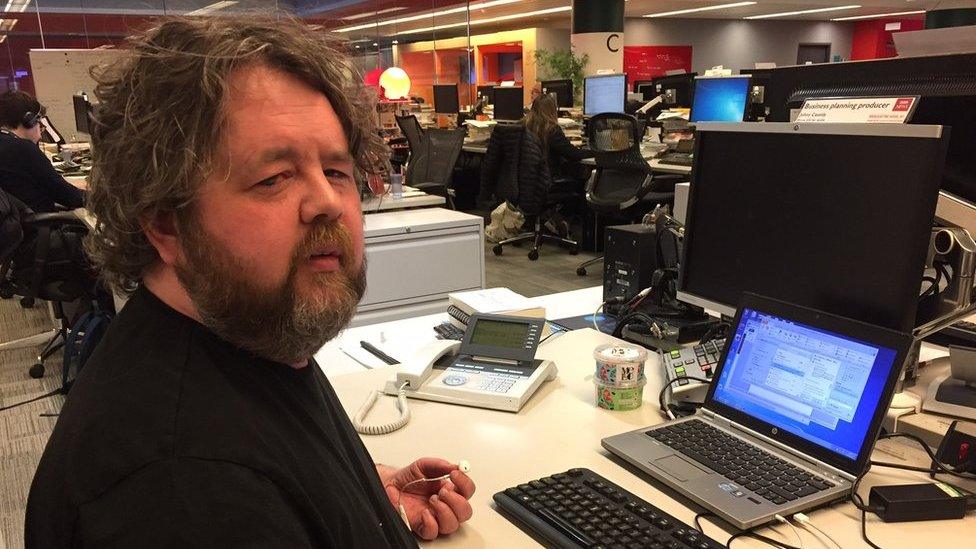Scenting an opportunity
- Published
Ravi Vanniyar: "Now I feel proud... I'm living with dignity"
India has a large blind population. According to government data, more than five million people in the country are visually impaired.
Finding employment is always a challenge for them but there might be new hope with a company that's come up with a novel idea to train up those who cannot see.
Peak rush hour for Mumbai's suburban railway system is 7.30am. An overcrowded train pulls on to an equally packed platform. A swarm of people jump out and there's a mad rush to exit the station.
At the far end of the platform though, there's one coach that people are still struggling to get off before the train leaves.
It's the compartment for disabled people.
Ravi Vanniyar feels around with his white cane, and gingerly steps down on to the platform. Once he's off the train, he walks much more confidently.
This is a daily routine. Ravi is blind after losing his eyesight due to a smallpox infection at the age of three.
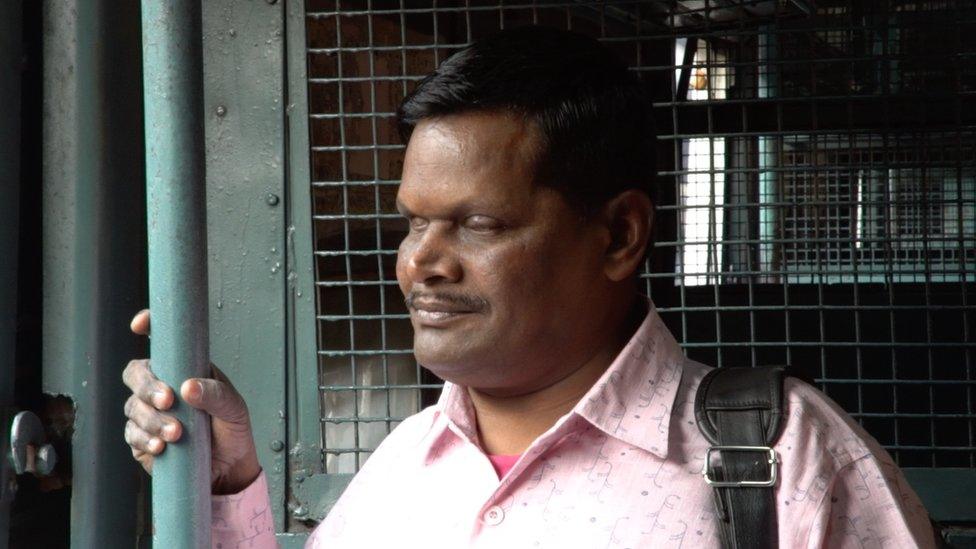
Ravi Vanniyar in Mumbai's rush-hour train
Outside the station, a bus owned by his employer is waiting to drop him and other staff off to their workplace.
Ravi has a job at a factory that produces raw material that goes into producing perfumes and fragrances. He's required to smell the material and check its quality. His company, Anthea Aromatics, also employs another visually impaired person.
Ravi's previous job was selling cutlery at railway stations. "It was a struggle. Sometimes I would make no sales and had to go hungry. Then there were instances when my stock would be stolen because I cannot see."
Then, three years ago he found out that a company was inviting people who couldn't see to test their sense of smell.
CPL Aromas, an international fragrance firm whose headquarters is in the UK, had carried out a study in India where it found that visually impaired people were better at identifying smells than the general population.
It began to train blind people, teaching them industry names for different kinds of fragrances. Ravi passed the course and got a job at Anthea.
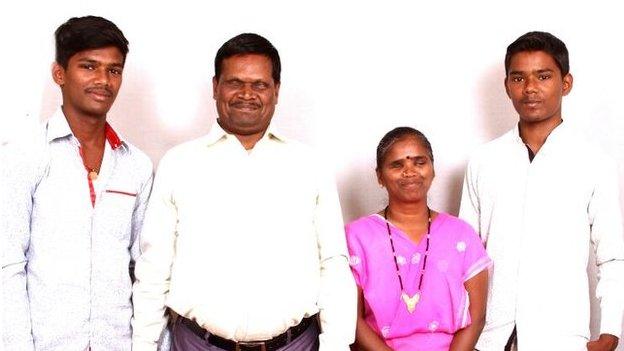
Ravi says he is proud to be able to earn and provide for his wife, who's also blind, and his two sons
Mathew Menacherry, the company's business development head, says they initially did it as charity, but now see the business sense in the decision.
"These people can really contribute. They really have a superior sense of smell, which even from a business perspective is very valuable to us because it's a rare commodity."
In a laboratory in another part of Mumbai, one more batch of blind students is being trained. On long, granite-topped tables, bowls of fruit and Petri dishes filled with spices are laid out. Six blind people are being taught how to identify different smells by two teachers.
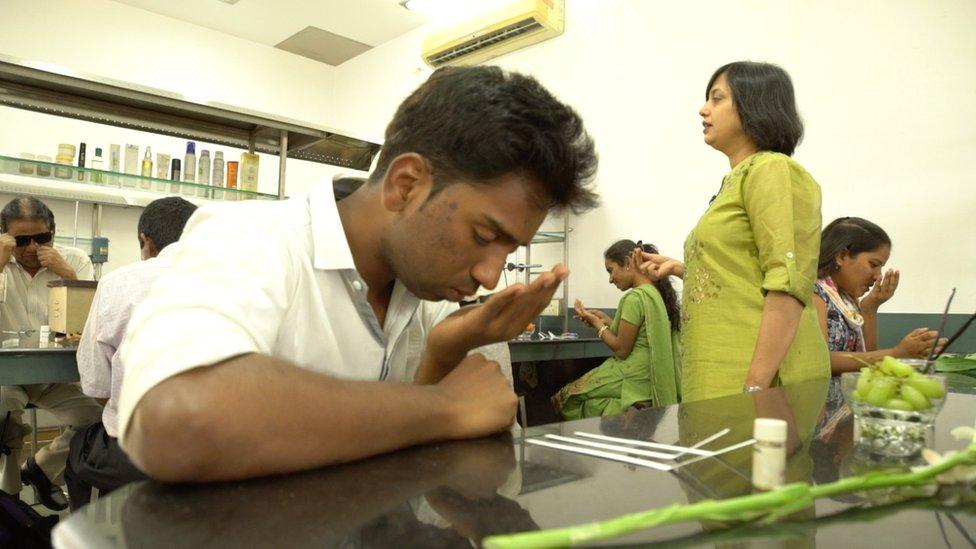
Renuka Thergaonkar training new "noses"
They all pick up sticks of cinnamon, and hold them close to the nose for a couple of minutes. "What do you smell?" asks the teacher. One reports the scent of a "woody note".
"According to me, these students are a step ahead of people who can see," says Renuka Thergaonkar, who runs the course. But she adds that there are challenges convincing blind students to finish the training. There are many dropouts.
"They come to us with a lot of psychological baggage. Secondly, they also have financial issues. It becomes difficult for them to manage learning as well as earning money for their families," she says.

Disability Works
The BBC's business and economics unit is looking at how businesses work with people with disabilities and how disabled people have made business work for them
A range of stories will feature across online, TV and radio from 20-24 February 2017
On Twitter and Facebook you can follow the hashtag #DisabilityWorks and at the end of the week you can download the Ouch podcast

In India, laws mandate that at least 3% of government jobs should be reserved for people with disabilities. But these are often difficult to get, and there aren't enough of them. So, disabled people are often left to fend for themselves when it comes to finding employment.
In recent years, the private sector has become more inclusive. Many companies have started hiring blind people as telephone operators.
But a job that uses a skill which visually impaired people might be better at than those who can see could be a game changer.
Six fragrance companies have so far recruited blind students from the course. But it's still not easy convincing firms to take them on.
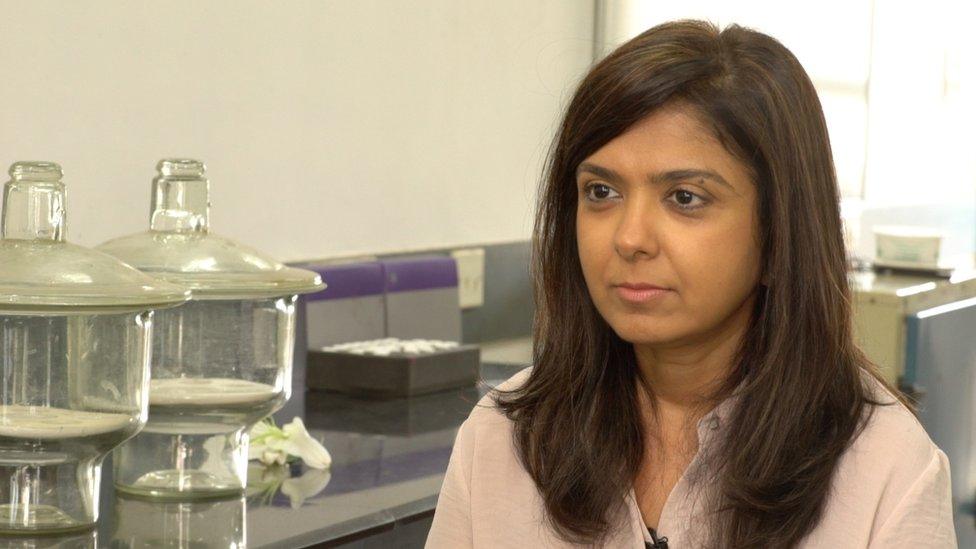
Sheetal Desai from CPL Aromas says many firms have concerns about taking on visually impaired people
"It's very challenging. We literally have to go door-to-door and ask industry to employ them," says Sheetal Desai, India director of CPL Aromas.
"They wonder how visually impaired people will get to work, what kind of support the company needs to give - those are the apprehensions."
Ravi requires very little help to get around. He has a long commute to work, using public transport, which is not very disabled-friendly in India. But the promise of a white-collar job and a salary at the end of each month is what keeps him going.
"I feel proud. I'm earning my own money and because of that my children are progressing," he says. "When I was a hawker, people would behave very badly with me. Now everyone at my workplace treats me with respect.
"I'm living with dignity."
- Published22 February 2017
